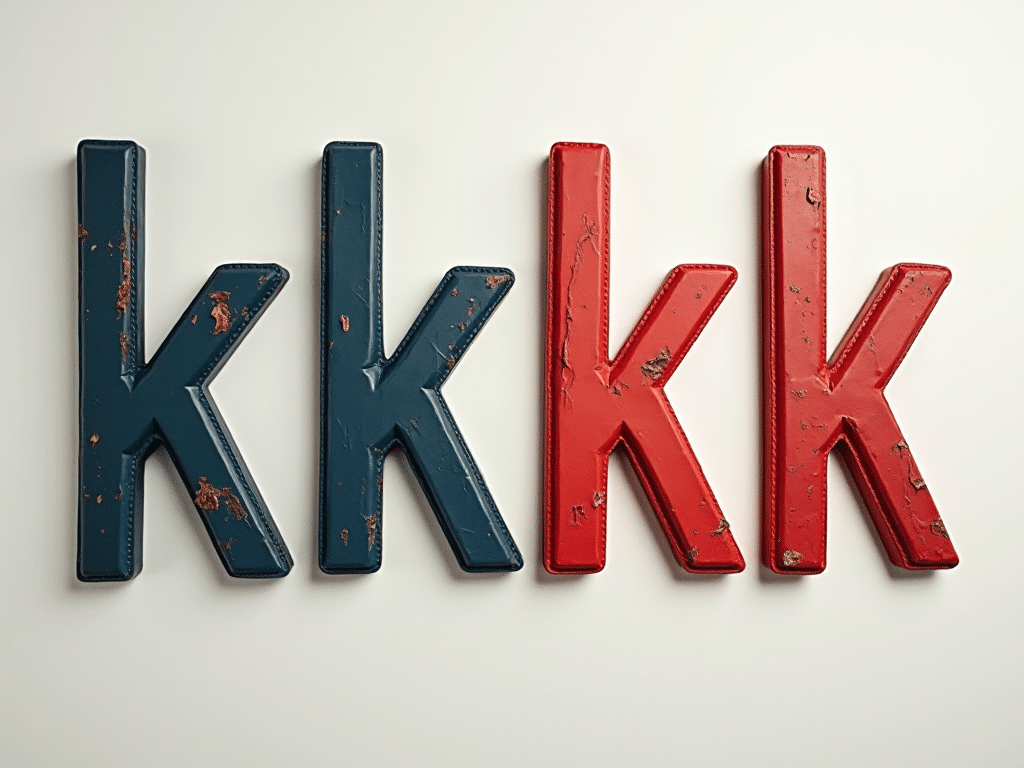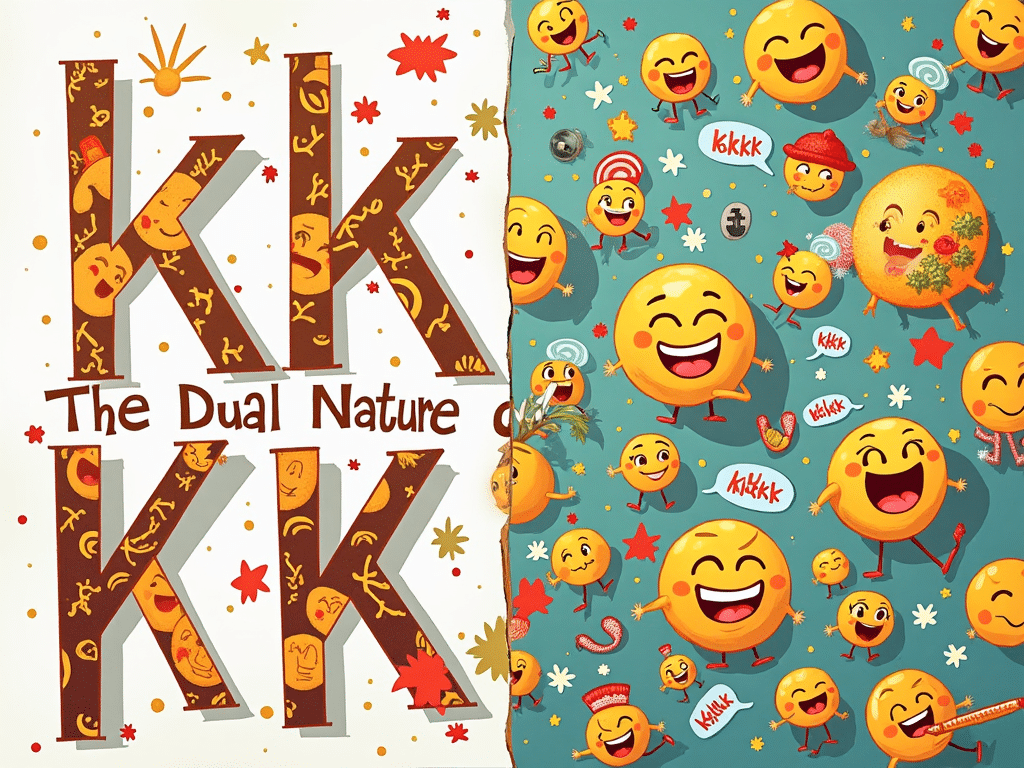Ever stumbled upon a Brazilian comment section and wondered why everyone seems to be typing “kkkk”? You’re not alone! This unique expression of online laughter has puzzled many internet users outside Brazil. Let’s dive into the world of “kkkk” and uncover its meaning, usage, and cultural significance.
| Key Takeaways |
|---|
| kkkk” is Brazilian Portuguese internet slang for laughter |
| It’s pronounced as “ka-ka-ka-ka” in Portuguese |
| The more k’s, the more intense the laughter |
| It’s primarily used in casual online conversations |
| Different from Spanish “jajaja” or English “haha” |
The ABCs of “kkkk”

“kkkk” is the Brazilian equivalent of “haha” or “lol” in English. It’s a textual representation of laughter that’s become a staple in Brazilian online communication. But why “k”? It all comes down to pronunciation.
In Portuguese, the letter “k” is pronounced as “ka”. So when Brazilians type “kkkk”, they’re essentially saying “ka-ka-ka-ka”, which mimics the sound of laughter. It’s that simple!
Also read: WWWW Meaning
How to Use “kkkk”
Using “kkkk” is pretty straightforward, but there are some unwritten rules:
- Casual contexts only: Use it in informal chats, social media comments, or text messages.
- Vary the length: The number of “k”s can vary. More “k”s = more laughter.
- Don’t overdo it: While “kkkk” or “kkkkkkk” is common, an extremely long string of “k”s might come across as sarcastic or exaggerated.
The Cultural Significance of “kkkk”
“kkkk” is more than just a way to express laughter online. It’s a part of Brazilian internet culture and identity. When Brazilians use “kkkk”, they’re not just laughing – they’re signaling their Brazilian-ness in the vast ocean of the internet.
As a Brazilian-American tech journalist, I’ve often found myself unconsciously switching between “haha” and “kkkk” depending on whether I’m chatting with my American colleagues or Brazilian family members. It’s a small but significant way of code-switching in the digital world.
Also read: MGMT Meaning
“kkkk” vs. Other Laughter Expressions

Brazil has a rich variety of online laughter expressions. Here’s how “kkkk” compares to some others:
- rsrs: A more reserved chuckle, often used by older generations
- huehuehue: An intense, sometimes mischievous laugh
- asuhasuhahsuha: A chaotic, keyboard-smash type of laughter
Each has its own flavor and usage, but “kkkk” remains the most widely used and recognized.
The International Perspective
For non-Brazilians, encountering “kkkk” can be confusing or even alarming. Here’s why:
- Misinterpretation: In English-speaking countries, “KKK” has a very different, negative connotation.
- Unfamiliarity: Many are used to “haha” or “lol” and might not recognize “kkkk” as laughter.
- Cultural differences: Other languages have their own laughter expressions (e.g., Spanish “jajaja”).
To avoid misunderstandings, it’s crucial to recognize these cultural differences in online communication.
Also read: DEMURE Meaning
Evolution of Brazilian Internet Slang

Brazilian internet slang has evolved significantly over the years. Let’s take a trip down memory lane:
- Early 2000s (MSN/Orkut era):
- “huahuahua” was popular
- “rsrsrs” gained traction
- 2010s:
- “kkkk” became dominant
- “huehuehue” emerged as a meme
- Present day:
- “kkkk” remains strong
- New expressions continue to emerge on platforms like TikTok
Early 2000s
huahuahua, rsrsrs
2010s
kkkk, huehuehue
Present Day
kkkk, new TikTok expressions
Expert Tips for Using “kkkk”
As someone who’s navigated both Brazilian and international online spaces, here are my top tips for using “kkkk”:
- Context is key: Use “kkkk” in casual, Brazilian-centric online spaces.
- Adapt to your audience: With international friends, consider using more universally recognized laughter expressions.
- Be mindful of length: A few “k”s are fine, but a very long string might come across as insincere or sarcastic.
- Embrace the culture: Using “kkkk” is a fun way to engage with Brazilian internet culture, even if you’re not Brazilian!
Also read: NAKADASHI
Conclusion
Understanding “kkkk” opens a window into Brazilian online culture. It’s more than just a laugh – it’s a cultural marker, a way of expressing identity, and a testament to the rich diversity of internet language.
Whether you’re chatting with Brazilian friends, exploring Brazilian social media, or just curious about internet linguistics, knowing about “kkkk” adds a valuable piece to your global communication toolkit. So next time you see a string of “k”s in a comment section, you’ll know – someone in Brazil is having a good laugh!
FAQs
- Is “kkkk” offensive?
No, it’s just a way to express laughter in Brazilian Portuguese. - Can I use “kkkk” if I’m not Brazilian?
Yes, but be mindful of the context and your audience. - Why don’t Brazilians use “haha” like in English?
While some do use “haha”, “kkkk” better represents the sound of laughter in Portuguese. - Is there a limit to how many “k”s I should use?
There’s no strict rule, but typically 3-7 “k”s are common. More than that might seem exaggerated. - How is “kkkk” different from “rsrs”?
“kkkk” represents a more hearty laugh, while “rsrs” is more of a chuckle or mild amusement.







